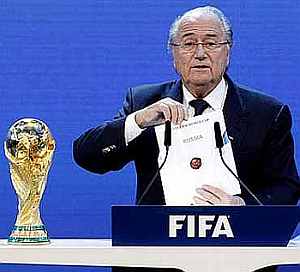FIFA has put to bed the thorny subject of World Cup hosting for the foreseeable future and will now have time to ponder its own path forwards after a tumultuous couple of months.
Having voted to send the 2018 World Cup to Russia and the 2022 tournament to Qatar, it may be another 10 years before FIFA has to go through the process again when it chooses who will stage the tournament in 2026.
That could force soccer's world governing body to take a good, long, hard look in the mirror.
The executive committee, which took the most far-reaching decision in international sport, was cut to 22 members from the usual 24 after two were suspended by the ethics committee last month, one for breaking loyalty rules and another for bribery.
FIFA President Sepp Blatter, embarrassed by the wrongdoing having been uncovered by the Sunday Times newspaper rather than the governing body itself, said at the time his federation needed to be tougher in ferreting out improper practices.
"We have to look to avoid in the future such situations. This is an item under scrutiny," he said.
 "With experience in life, you should not repeat twice the same error," he added.
"With experience in life, you should not repeat twice the same error," he added.
Former general secretary Michel Zen-Ruffinen has led calls for an external investigation into the goings-on inside FIFA.
The question is whether soccer's governing body really will act or whether, with World Cup bidding out of the way for a decade, it will simply hope the dust will settle and the whole affair will be forgotten.
Blatter has insisted the ethics commission, headed by former Switzerland forward Claudio Sulser, is capable of policing FIFA.
But, amid growing concern at the damage to FIFA's host country, the Swiss government's sports minister is looking into the possibly of closing a loophole in its anti-corruption laws which do not cover international sports organisations.
If the law is changed, FIFA could be forced to accept outside interference whether it likes it or not.











 © 2025
© 2025